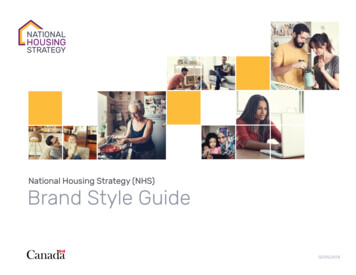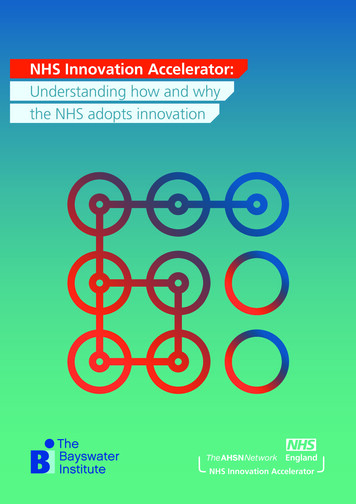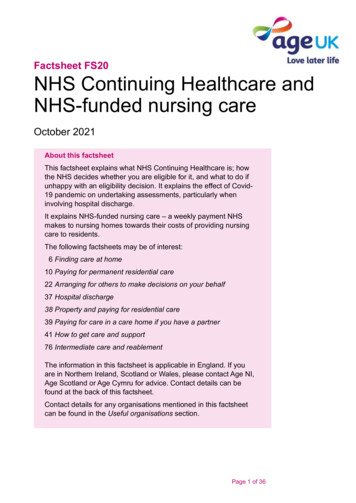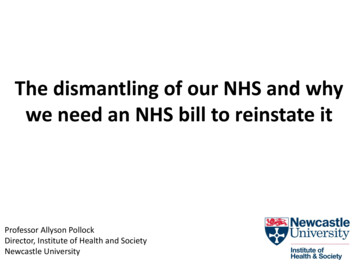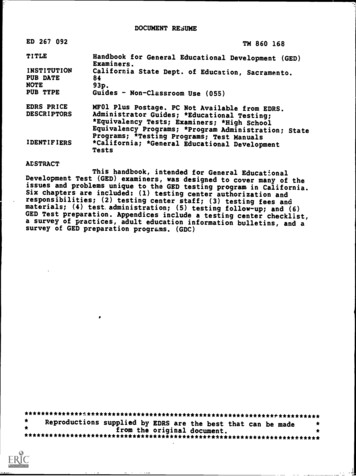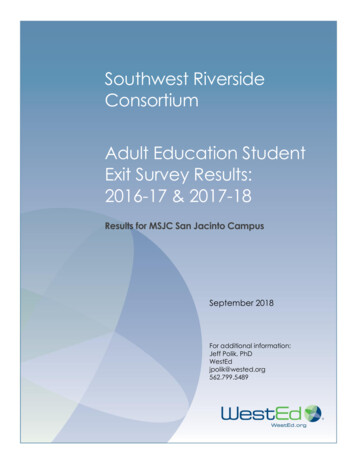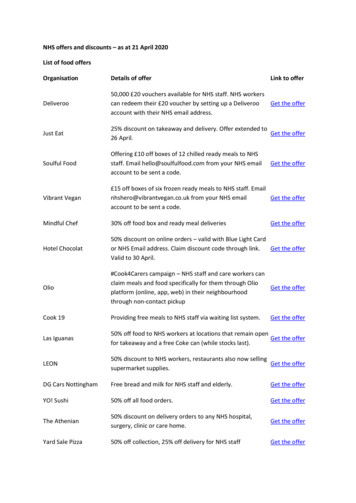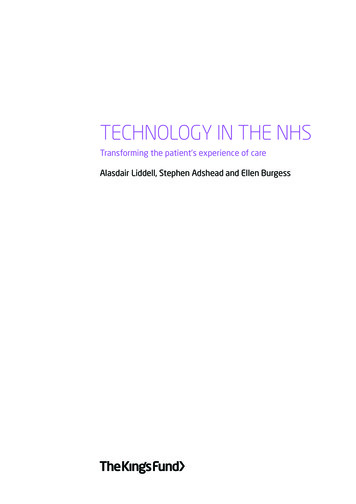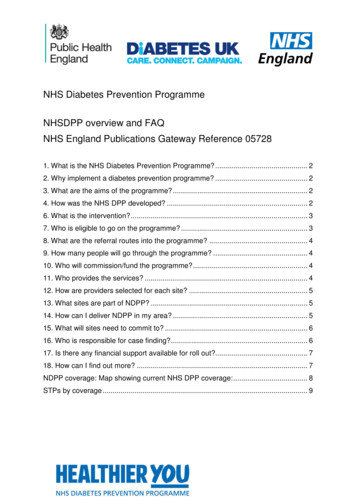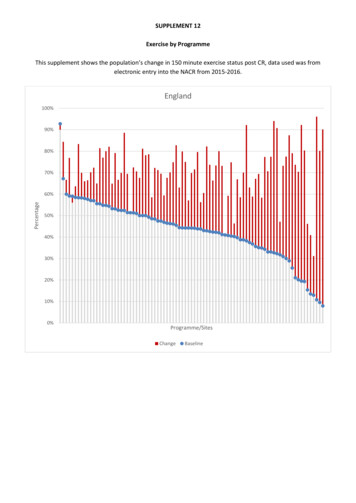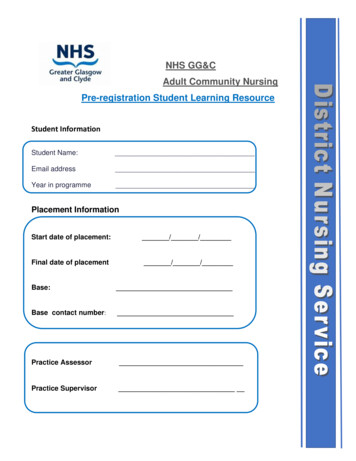
Transcription
NHS GG&CAdult Community NursingPre-registration Student Learning ResourceStudent InformationStudent Name:Email addressYear in programmePlacement InformationStart date of placement:/ /Final date of placement/ /Base:Base contact number:Practice AssessorPractice Supervisor
CONTENTSpage numberAim and Introduction to workbook3Principles and values of NHS GGC.4Pre placement evaluation - Knowledge of role of the DistrictNursing Service5Pre / Post Placement Knowledge Evaluation6Activity 1 Investigating Health Issues in the Community7Activity 2 Formal and Informal Caring Support Systems8Activity 3 Group Sessions9Activity 4 Clinical Skills10Activity 5 Integrated care in the community11Scenario 1: Anticoagulation therapy post hip replacement12Scenario 2: Bowel Care15Scenario 3: Decision making17Scenario 4: Deteriorating patient20Scenario 5: End of life care – patient being discharged24Scenario 6: First Visit / Assessment31Scenario 7: Wound review / pressure ulcer34Scenario 8: Mental Health36Adult support and protection38Inequalities in Health39Patient group directives42Reflect on what you have learnt43Appendix 144Acknowledgements452
AimThis workbook is designed for pre-registration nursing students as a self directed learning toolto enhance the learning experience of NHS Greater Glasgow and Clyde District NursingService community placement.Introduction to the workbookCompletion of the workbook and the time allocated is negotiated between practice supervisor(PS) and student. The PS’s may elect to use this workbook in part, focusing on aspectsrelevant to their caseload, or, request this is completed in full.Although not essential for University assessment purposes, all activities you are requested tocomplete will inform your PS / Practice Assessor (PA) of your progress. The workbook shouldsupplement learning and does not replace mandatory completion of your SOAR/PAD.Your PS will allocate set activities for you to complete Completion involves self-study, using resources available within the base, resourcesavailable in the locality, or at home via virtual platforms or online resources Each activity should be mapped by yourself against your platforms and proficiencies /domains and essential skills. Provide opportunity for you to discuss your findings with your PS/ PA on a regular basis,this may be face to face or via a virtual platform. Evidence of learning demonstrated in the workbook will aid the PS / PA with yourInterim and final assessmentWhat will I have to do?Your PS will discuss this workbook with you. You may have to search for information andpresent this, carry out a task related to practice and report on this. Each activity / scenario isdescribed in detail, you should be given adequate time to compete required work. You shouldupdate your PS on your progress while undertaking activities. A reflective account (reflectivemodel of your choice) should be completed following each scenario.What support can I expect in completing the activities?Your PS’s role involves negotiating time required with you to complete each activity, discussactivity with you so you understand what is expected.Do not include patient identifiable information in this resource.Please note that this is your document and you would retain this.3
The expectation of students is that they work within Principles and values ofNHS GGC.NHS GGC’s values represent the care our patients can expect, and how this care shouldbe delivered by our staff. Our local values in NHS GGC are: Care and Compassion Dignity and Respect Openness, Honesty and Responsibility Quality Team WorkOur values should be visible in everything we do and drive the improvement of ourservices. NHS GGC’s values are directly aligned to NHS Scotland’s values which are sharedby all NHS staff throughout Scotland.These values underpin and support NHS Scotland’s national quality ambitions: Person-centred Safe Effective Efficient Editable Timely care4
KNOWLEDGEStudent completes this page on their first day in practice.Do not worry if your knowledge is limited, it is not a test.What has been your experience of the District Nursing service to date?What is your understanding of the role of the District Nursing Service?What do you want to specifically learn more about from the placement?5
Pre / Post Placement Knowledge EvaluationPlease rate your knowledge and understanding of the following topics on the scales 0-3 below. This willgive you your knowledge baseline which you can compare against your knowledge scores at the end ofthe placement. This will also help us evaluate the learning opportunities available within the placementScenario 1 Anticoagulation therapypost hip replacement0: Noknowledge1: Someknowledge2: Moderate0: Noknowledge1: Someknowledge2: Moderate0: Noknowledge1: Someknowledge2: Moderate0: Noknowledge1: Someknowledge2: Moderate0: Noknowledge1: Someknowledge2: Moderate0: Noknowledge1: Someknowledge2: Moderate0: Noknowledge1: Someknowledge2: Moderate0: Noknowledge1: Someknowledge2: Moderate0: Noknowledge1: Someknowledge2: Moderate0: Noknowledge1: Someknowledge2: Moderateknowledge3: GoodknowledgeScenario 2 Bowel CareScenario 3 Decision makingknowledgeknowledge3: Goodknowledge3: GoodknowledgeScenario 4 Deteriorating patientScenario 5 End of life care –patient being dischargedknowledgeknowledge3: Goodknowledge3: GoodknowledgeScenario 6 First Visit / AssessmentScenario 7 Wound review /pressure ulcerknowledgeknowledge3: Goodknowledge3: GoodknowledgeScenario 8 Mental Healthknowledge3: GoodknowledgeScenario 9 Adult support and protectionknowledge3: GoodknowledgeScenario 10 Inequalities in Healthknowledge3: Goodknowledge6
Activity 1 Investigating Health Issues in the CommunityOverview of activityThe student carries out a study of a health issue of importance to that locality (the area covered by the PrimaryCare Team). Information gained will be reviewed with respect to its value and importance to local health carepractitioners.Outcomes This task will allow the student to: Develop and understanding of a local neighbourhood or communityAppreciate the importance of local knowledge to primary care team membersDevelop skill in adapting information from multiple sources for local applicationApply information gathering skills to a specific health issueSTUDENT GUIDANCEYour task is to prepare a folder of information that illustrates the value to the localPrimary Health care Team of local and national knowledge and information by focusing on ONE socialissue of interest that affects health within the locality (e.g. unemployment, social deprivation, inequality ofaccess to services, social issues such as vandalism).Impact could include perinatal mental health, child development family dynamics, breastfeeding and theUNICEF baby friendly initiative (national and international), alcohol and substance dependence, depression,maintaining healthy weight, nutritional status, engagement with healthcare services etc1. Choose, with your practice supervisors help, a locality within the catchment area of the practice or nursingteam.2. Focus on one social issue of importance within the chosen community/neighbourhood. Compileinformation on the issue that might inform or assist a nurse coming to work within the locality.3. Compile information about the possible health consequences of that social issue. Focus on one impactonly and gather information showing the clear link.4. Add a section about the COVID pandemic and the impact that has made to the social issue and the localityyou are in5. Prepare your information in a format that a new member of staff might read (see 2 above) and prepare topresent your findings to your practice supervisor. Time will be allocated afterwards for discussion, questionsand feedback.7
Activity 2 Formal and Informal Caring Support SystemsOverview of activityThis task facilitates the student in an investigation of non-NHS services available within the locality. The studentcreates a folder, which should include contact details, descriptive/informative materials as provided by the chosenagency and any links to any further sources of information such as web resources.Within the folder will be a report describing an investigation of the agency’s work within the National, and moreimportantly, within the local setting.There should also be a section about the impact of the COVID pandemic on the services.Outcomes This task will allow the student to: Develop knowledge and understanding of the role of charitable/voluntary/private care within a communitysettingIdentify the salient features of ONE such organisation active within the localityDevelop knowledge and skill in investigation and recording data for use within the localitySTUDENT GUIDANCEThis activity requires you to choose ONE charitable, private sector or voluntary agency providing a service in thearea and to compile a folder of information for local staff and future students on that agency.Link the charity to the COVID pandemic in terms of demand by the community you are in – for example - increase inmental health issues, vulnerability of families, domestic abuse, alcohol and substance, physical health.Within the folder you are required to submit a report describing your investigation of the agency’s work within theNational, and more importantly, within the local setting. The report should include a description of communicationand liaison systems between the agency, other agencies and the Primary Health Care Team.1. Choose an agency with your practice supervisor– they will advise on which are appropriate, having not beencovered recently, and which operate locally. (e.g. certain organizations may operate only in, or mainly in, England)2. Focus on one agency that pertains to your field of nursing and that is used in the locality.3. Your folder should include contact details, descriptive/informative materials as provided by the agency and anylinks to any further sources of information such as web resources.4. Include the impact of the COVID pandemic on the agency and the demand for the agency in your report.8
Activity 3 Group SessionsOverview of activityThe student will observe (and participate in where appropriate) one or more group sessions involving patients orclients.The session/s may be arranged by the practice supervisor but may be any local health-related groupsession by a colleague. The student will compile a short report on the rationale for the session/s, the structure andorganisation of the session/s, and on teaching and facilitation methods observed.Consider the recommencement of group work after the pandemic – what considerations need to be put in place?What would be the impact of these groups not continuing? For example breast feeding support, baby massage,smoking cessation, substance and alcohol dependence support, talking therapies etc.Outcomes This task will allow the student to: Develop understanding of the planning and delivery of group sessionsDevelop communication skills within group settingsSTUDENT GUIDANCEOver the weeks you spend in the placement, identify with your practice supervisor one or more groupsessions that you might attend if this is possible. During these, take notes on the reason for the group, thestructure of the session (talk, discussion, group activity) and any interpersonal, technical or non-technicalskills that you see employed by the presenter or facilitator.You may also wish to interview the facilitator and ask questions about the session. For each session, compilea short report on the rationale for the session/s, the structure and organisation of the session/s, and onteaching and facilitation methods observed.Discuss this with your practice supervisor at the feedback session. If there are not any groups running atpresent – an alternative is given1. Choose a group to visit/found out about a group used by the community that links with your field ofnursing2. Report on the structure/numbers/client group/referral systems/location etc3. If the group is not running now – what considerations would need to be taken for recommencement?Refer specifically to Government guidance around COVID restrictions4. What is the impact/possible implications on the client group if these groups are not running. Consider thecurrent and future impact in terms of resources and health and wellbeing5. Compile a report giving information which will support group facilitators9
Activity 4 Clinical SkillsOverview of activityFor this activity, the student will compile a report, based on a visit, or, more probably, a series of linked visits to aparticular patient/client.The report should focus on clinical skills as observed (including participation by student where appropriate), andshould provide descriptions of, and reflective observations on, the application and adaptation of selected clinicalskills within a home environment.Outcomes This task will allow the student to: Develop knowledge and understanding of skills applied within the P.H.C. TeamDevelop knowledge and skill in applying nursing techniques within community settingsIdentify possible barriers to effective application of nursing skills within a home environmentSTUDENT GUIDANCEYour task is to investigate the application of technical and non-technical (e.g. communication, recording,referring skills) within community settings (the homes of patients/clients). Write a report, based on a visit ORvisits to a patient/client, during the placement.For the feedback session with your practice supervisor:1. You should compile a reflective report that should focus on clinical skills, and should provide descriptionsof, and reflective observations on, the application and adaptation of selected clinical skills within a homeenvironment.Include specific examples of --a) Problems and barriers to effective care within this non-institutional setting andb) How the skills are used or adapted by Primary Care staff to overcome those barriers.Ex: a patient’s bathroom proves unsuitable for standard moving and handling procedures.Ex: a patient, living on his own, has mobility and speech difficulties.2. Has anything changed with care delivery during the pandemic? How and what is the impact of this?Discuss this with your supervisor and record in your report.3. You should attempt to provide a rationale for particular observed nursing actions, using web based andliterature-based sources as well as discussions with practitioners to form this rationale.The report will form the basis for a discussion with your practice supervisor at the feedback session.N.B. Change family names and any details that might identify the family within the report in order to preserveconfidentiality.10
Activity 5 Integrated care in the CommunityOverview of activityThe week’s activity asks the student to apply assessment skills to a particular patient/client situation, based ona real patient care situation requiring assessment, and inviting the student to utilise learning achieved during theprevious weeks. The tasks are to identify needs of the patient/client and family, and to prepare a report on theassessment of nursing needs at that stage of careOutcomes This task will allow the student to: Develop knowledge and understanding of assessment processes within Primary Care settingsApply current assessment skills to a designated patient care situationDevelop knowledge of The Primary Care Team and other supportive services in action withincommunity settingsSuggested time allowance to complete task is minimum seven hoursSTUDENT GUIDANCEThe activity will allow you to draw together knowledge and skills from the learning experiences of the last fewweeks.Your practice supervisor will introduce you to a current individual/family care situation where there is scopefor you to attempt an assessment of current nursing needs. If there is a need for actual nursing assessment,be advised that the practitioner will carry out the actual assessment procedure.Your task is to observe the interaction/s and attempt to perform your own nursing assessment of thesituation, identifying needs of the patient/client and family.Following the visit/s, you will prepare an assessment report, employing the format and paperwork usedlocally. If this is not possible you may use any recognised assessment structure you have been given inUniversity. It must, though, be suitable for use as a basis for identification of need & planning of nursingactions (negotiate this with your practice supervisor).Try to include your thinking on how any particular need might be met, and by whom, however the main focushere is on assessment within the unique setting of Primary Care rather than the delivery of care. You shouldattempt to develop a rationale for your decisions, using resources from your searches and from previouslearning, for the end-of-week discussion with your practice supervisor.This assessment report will be presented to your practice supervisor for comments and discussion at thefeedback session, which may include comparison (with your practice supervisor’s agreement) of yourassessment with actual documents on the patient situation compiled by the nursing team.11
Scenario 1 Anticoagulation therapy post hip replacementPlease identify which learning outcomes this maps to in your SOAR / PADAnticoagulation therapy post hip replacementYou have received a referral from the local hospital orthopaedic ward in regards to a patientcoming home and requiring anticoagulation therapy to be administered daily for the next 4weeks.The information you have;Mary Smith 79 years old admitted to the hospital after a fall. She is being discharged hometomorrow. Mary lives with her elderly husband and she has a diagnosis of dementia.Hip fracture noted on xray and total hip replacement surgery was carried out 7 days ago.Mary has been prescribed enoxaparin injections following surgery for 35 days. This isprescribed in hospital at 6pm.Mary is now slowly mobilising and will be reviewed on discharge by the communityphysiotherapy and occupational therapy team.With this information do you think you would need further information from thedischarging ward?12
You have now spoken with the nurse in the discharging ward and a 28 day supply ofenoxaparin 40mg will be supplied with her other discharge medication. They will givetomorrows dose before discharge and document time on discharge paperwork.Whilst talking to you, the nurse has expressed concern in regards to the husbands behaviouras at times he too appears disorientated and confused. He is going to be the main carer andhas refused any assistance from Social Work.Considering this new information is there anything else you would consider in regardsto your arranged visit?How will you proceed with the visit?How will you document the patients care?13
You have visited Mrs Smith this afternoon and found both her and her husband confused anddisorientation. They could not find the discharge paperwork although did have the dischargeprescription with the prescribed Enoxaparin 40mg. They do not appear to have had anythingto eat or drink today. The house is unkempt and cluttered.How will you document the patients care?Do you need to refer onwards to other services?Please complete a reflective account based on your learning from this ent/https://www.nmc.org.uk/standards/code/GGC resource directorate/districtnurses/14
Scenario 2 Bowel CarePlease identify which learning outcomes this maps to in your SOAR / PAD82 year old male recently discharged from hospital following admission for constipation,subsequent to bladder retention. A bladder scan showed a residual of 840mls. Jim lives withhis wife, Isobel who is 80 years old. A referral has been sent to the district nursing service forbowel management and a trial without catheter in 8 weeks’ time. He has been prescribedbisacodyl 10mg suppositories to be administered on alternate days and requires assistancewith changing his catheter leg bag weekly. His wife however is keen to help and would like tobe shown how to attach/detach catheter night bags & change the leg bag so that she feels‘useful’, however neither Jim nor Isobel feel confident in administering the suppositories &would feel better for the district nursing service to manage this.Jim has been sent home with no catheter supplies & little education. Both Jim & Isobel arequite anxious about this new situation they have to deal with.What do you need to consider? What other information would you be looking toascertain?15
How would you case manage this patient?Please complete a reflective account based on your learning from this GC resource irectorate/district-nurses/16
Scenario 3 Decision making in community settingsPlease identify which learning outcomes this maps to in your SOAR / PADAs a newly qualified staff nurse, you are working within a district nursing service and havebeen allocated to work this weekend. When you arrive at work on Sunday morning, you areone staff nurse short. The caseload can be safely managed with the staff members present.You have been asked to hold the phone today and are therefore co-ordinating the care ofpatients.You receive a call from the Hub (out of hours) and have been asked to visit a patient to reviewtheir wound. The caller begins to hand over the patient.Hermione Granger a 26 year old female has phoned NHS 24 as her dressing was ‘wet andfalling off’. Hermione has recently been discharged from hospital following treatment for anabscess which included a skin graft. The caller advises that Hermione has a history of being anintravenous drug user. Hermione is not staying at her usual residence but is currently residingin her boyfriend’s home. The boyfriend is also known to be an intravenous drug user.What might you consider when delegating this task?You have considered the delegation resource and determined that this is a complex situationand is not suitable to delegate to a Health Care Support Worker. You have thought about theLone Working Policy and feel that it would be too much of a risk to visit the patient alone. Youdecide to ask a Health Care Support Worker to meet you at the address.When you arrive, yourself and your colleague find the address and note that there appears tobe a party underway. There is loud music coming from the house, flashing lights and numerouspeople.17
Considering your prevention and management of violence and aggression training whatare the next steps you might take?How will you proceed with this visit? Will you continue as planned with a double visit?Please justify your answerIf you decided not to continue with the visit what actions might you take?How will you preserve the safety of your patient?18
You decide to visit to cleanse and apply an appropriate wound dressing. Please consider thefollowing questions/ statements and provide your responseHow will you document the patients care? How will the patients care be reviewed?If you had left something in the car which was required for re-dressing the wound, howwould you deal with this? Would you ask the HCSW to leave and come with you?Write down your thoughts.Please complete a reflective account based on your learning from this s/nmc-publications/nmc-code.pdfGGC resource irectorate/district-nurses/19
Scenario 4 The Management of a Deteriorating PatientPlease identify which learning outcomes this maps to in your SOAR / PADYou arrive at 11am to visit Jean McSporran to administer a vitamin B12 injection. Jean isundergoing chemotherapy for breast cancer and is neutropenic. During the visit Jean asks youto look at her husband Jimmy.Jimmy is a retired lorry driver 68 years old. 3 day history of productive cough and shortness ofbreath.Past Medical History (PMH) Hypertension, AnginaDrugs: Atenolol 50mg daily, aspirin 75mg daily, simvastatin 20mg daily , GTN spray prn.Allergies nilPresentation:A – Airway: Patient is talkingB - Breathing: Respiration rate 22C- Circulation: HR 104, BP 100/60 (normal 170/90) warm peripheries, he has not passed urinesince 11pm last night.D - Disability: drowsy a little confused as to who you areE – Exposure:Temp 38 pale clammy skin to touch, dry mucous membranesNB: please follow an A-E assessment of Jimmy, the use of Community NEWS willsupport your clinical judgement NOT replace it.Actions: Clinical judgement- what do you suspect?20
How would you communicate this with Jean and Jimmy?Please Action the following :Explain how you would undertake an assessment on JimmyExplain what you are looking for and why?Place the vital signs results above in the Community NEWS chart and calculate theNEWS score.21
Explain how you would escalate, if appropriate, using your judgement and theCommunity NEWS escalation adviceComplete an SBAR to show how you would assist clear hand over of information ionDecision22
Please complete a reflective account based on your learning from this rovement-zone/qi-tools/sbarGGC resource irectorate/district-nurses/23
Scenario 5 End of Life Care, Patient being discharged homePlease identify which learning outcomes this maps to in your SOAR / PADYou have returned to the office at lunchtime and have received a telephone message from amedical ward in regards to a patient who wishes to return home for end of life care. They haverequested that someone call them to discuss the planned discharge.What information do you think you would need from the discharging ward to ensuresafe transition from hospital to home?You have contacted the ward and you now know:Jim Brown is 92 years old and he lives with his daughter, son in law and two grandchildren.The family are aware and have agreed with Jim’s wish to die at home.Jim has been receiving treatment for prostate carcinoma with brain metastases. He is now atthe end stage of life and requires palliative care. The palliative care team in hospital are awareand are in agreement that Jim is discharged home with referral to the palliative care team forsupport and symptom management.A hospital bed will be delivered to the home within the next 48 hours, Jim is unable toweightbear and will remain on bedrest due to his fraility and poor balance. Jim can no longerswallow medications and a McKinlay syringe driver was commenced yesterday with MorphineSulphate 10mgs, Midazolam 2mgs and Hyoscine Butylbromide 10mgs over 24 hours. A ‘justin case box’ has been ordered from pharmacy, the family have been given information aboutthis.24
Considering this information is there anything else you should consider for his safedischarge?You have contacted Jim’s daughter to discuss discharge. She is keen to have him home assoon as possible as she can see him deteriorating every time she visits. She has informed youthat the bed will be delivered this afternoon.Considering this information, is there anything else you would need to arrange for safedischarge?When would you organise to visit?25
Is there any other services you need to speak with to discuss how best to support Jimand his family?Define palliative care.What is specialist palliative care and how does this differ to general palliative care?26
Give examples of conditions that patients may be living with that are in receipt ofpalliative care.What are the signs you may see that would indicate that a patient is actively dying?27
Symptom control is a very important part of palliative and end of life care. Pain control is acommon aspect of care.Demonstrate an understanding of the management of pain in patients with palliativecare needs.Describe some of the more common possible side effects of analgesic drugs.Explain the different reasons a syringe pump may be considered for the delivery ofmedications.28
When delivering end of life care what are the four key principles that all heath careprofessionals should consider?1234Why are these principles so important when caring for a dying patient?When a patient dies in hospital Last Offices are carried out in the care of the deceased.In discussion with your Practice Supervisor/Practice Assessor, describe how adeceased patient and relatives are cared for at home by nursing staff.29
Please complete a reflective account based on your learning from this ative-care.htmlGGC resource linkhttps://www.nhsggc.org.uk/about-us/professio
This workbook is designed for pre-registration nursing students as a self directed learning tool to enhance the learning experience of NHS Greater Glasgow and Clyde District Nursing Service community placement. Introduction to the workbook Completion of the workbook and the time allocated is negotiated between practice supervisor (PS) and student.
